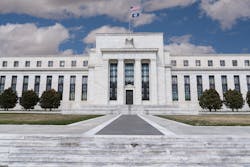US Interest Rate Likely to Peak Higher Than Anticipated: Powell
U.S. interest rates will likely peak at a higher level than previously anticipated due to economic data that came in stronger than recent trends suggested, Federal Reserve Chair Jerome Powell said Tuesday.
He noted that January figures for employment, consumer spending, manufacturing production and inflation pointed to a partial reversal of earlier softening trends.
This was likely due to "unseasonably warm weather," said Powell in prepared remarks for a hearing before the Senate Banking Committee.
"If the totality of the data were to indicate that faster tightening is warranted, we would be prepared to increase the pace of rate hikes," he added.
Powell's remarks pressured U.S. stocks, which spent much of February in the red as Treasury yields climbed amid worries of more aggressive Fed actions to counter inflation.
The S&P 500 slipped 0.6% close to an hour after trading started, despite being near-flat before Powell's comments were reported.
- 'Extremely tight' -
The U.S. central bank has raised its benchmark lending rate eight times since early last year, as the Fed contends with inflation that remains stubbornly above its long-term target of 2%.
Despite its forceful moves, the Fed's favored inflation measure, the personal consumption expenditures price index, rose slightly to reach an annual rate of 5.4% in January.
At the same time, the labor market remains "extremely tight," Powell said.
"To restore price stability, we will need to see lower inflation in this sector, and there will very likely be some softening in labor market conditions," he said.
U.S. job gains had surged unexpectedly in January while unemployment slipped to its lowest rate in more than five decades, despite efforts to cool the economy.
While wage growth has slowed, analysts believe this is not yet enough for the Fed.
A strong labor market supports incomes and, in turn, demand.
Policymakers have been concerned that elevated wages could feed into inflation, complicating the battle to rein in prices.
Powell's appearance on Tuesday comes shortly after the U.S. central bank released a semiannual report on monetary policy, which pointed to a tight labor market, robust job gains, historically low unemployment and elevated nominal wage growth.
"The process of getting inflation back down to 2% has a long way to go and is likely to be bumpy," Powell said.
"We will stay the course until the job is done," he added.
While some sectors like housing have slumped since the Fed's aggressive campaign against inflation, other areas remain stickier.
Copyright 2023, Agence France-Presse
About the Author
Agence France-Presse
Copyright Agence France-Presse, 2002-2025. AFP text, photos, graphics and logos shall not be reproduced, published, broadcast, rewritten for broadcast or publication or redistributed directly or indirectly in any medium. AFP shall not be held liable for any delays, inaccuracies, errors or omissions in any AFP content, or for any actions taken in consequence.
